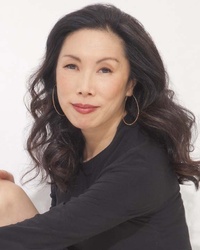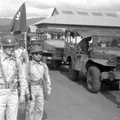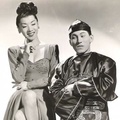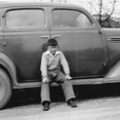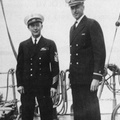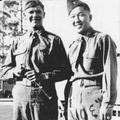Jodi Long was made for the theater. Yet, she enjoys her work in films and has a knack for playing judges and tiger moms on television.
Long is a Broadway actress with more than 30 major theater roles, and appearances in 18 feature films, dozens of television shows, and produced her own documentary about her theatrical parents. She is going strong with television and her own one-woman theater project for 2013.
“I have made a living from acting for a very long time, and I have been really lucky,” Long said. “Luck comes with hard work, perseverance, and from being incredibly tenacious and especially when everyone seemed to be saying no to me.”
Long’s current project is Sullivan & Son, a comedy series on TBS that was just renewed for a second 10-episode season returning June 13 on TBS. She portrays “Ok Cha Sullivan,” the frugal Korean immigrant wife of “Jack Sullivan” (Dan Lauria) and mother of “Steve Sullivan” (Steve Byrne).
The show set in a multi-generation family bar in Pittsburgh. Byrne is a real life Pittsburgh-native and born to a Korean mother and an Irish father. The show centers on Byrne, who leaves a successful corporate law practice in New York to take over the bar when his father announces that he wants to retire.
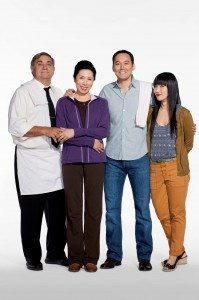
Sullivan and Son cast, from left, Dan Lauria (Jack); Jodi Long (Ok Cha); Steve Byrne (Steve); and Vivian Bang (Susan). (TBS photo) Courtesy of Asian American Press.
Vivian Bang portrays little sister “Susan Sullivan.” She is an NYU Tisch School of the Arts graduate and is well known as the MTV’s web Status Updates girl. Some of her film credits include Jim Carrey’s Yes Man and Memoirs of a Geisha.
The patrons are a tapestry of White, Black, Middle Eastern, Asian, and Latino, with Roy Wood Jr., Owen Benjamin, Valerie Azlynn, Ahmed Ahmed, Christine Ebersole, and Brian Doyle-Murray as recurring cast members. They speak freely and lay all race issues on the table as patrons who argue amongst themselves as friends.
The type of stereotypes so often present in other network shows are not present here, Long said. A cross-fabric of people have a relationship based on the bar and can razz each other about everyday encounters and experiences with humor, she said.
“It is like that in real life too,” Long said. “It is so interesting about how our show addresses race head-on.”
It works, Long said, because it is doesn’t point the finger of blame and uses a perspective that is palatable to a wide spectrum. The show tackles issues in much the same way as Archie Bunker did with All In The Family in the 1970s, she said.
“We have to talk about these issues in America,” she said. “Let’s put it out there so we can laugh at them because laughter is the common denominator.”
“Ok Cha” is part tiger mom and not unlike many immigrant Asian mothers that “come from the old country, whichever one, and want their children to get a good education, work hard, and to have a better life than the one she came from,” she said.
“They take that to the nth degree with me,” Long said. “People come up to me on the set and say that I am just like their Jewish mother who came from Poland.”
For Long, who has appeared in countless television shows since the 1980s, Sullivan & Son stands out as a special cast and crew that work for the common goal of a great show. They work magic on camera, and work well together behind the scenes, she said.
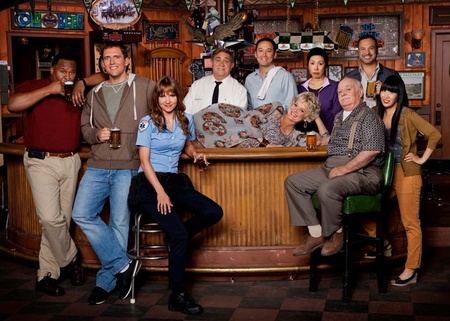
"Sullivan & Son" cast, in front from left, Roy Wood Jr. (Roy Williams Jr.); Owen Benjamin (Owen Walsh); Valerie Azlynn (Melanie Sutton); Christine Ebersole (Carol Walsh, on bar); Brian Doyle-Murray (Henry “Hank” Murphy); and Vivian Bang (Susan). In back, Dan Lauria (Jack); Steve Byrne (Steve); Jodi Long (Ok Cha); and Ahmed Ahmed (Ahmed Nassar). TBS photo. Courtesy of Asian American Press.
Long has portrayed Korean immigrant mothers in The Hot Chick and in All American Girl, the 1994 series starring Margaret Cho. The show sparked Cho’s career and she became vocal about the unreasonable demands she experienced regarding her appearance and in script-writing for an Asian American family.
Cho visited the Sullivan & Son set during tapings where cast members reflected on the example she set with her show. Cho says that everyone from All-American Girl is still like a family and that it now extends to other Asian Americans in the media, television and film, art and music as “every kind of greatness is a new member of our family.”
“I love Jodi like she is my mother, even though we are actually about the same age,” Cho said. “She is a wonderful actress and a great friend.”
Long said she is pleased that Sullivan & Son offers a central, recurring role in a multi-generational Asian and diverse supporting cast in a show that is making a social statement.
“The change is slow but it is progressive,” Long said.
Long recalled that Pat Morita was the first Asian American to star in his own series with Mr. T and Tina in 1976. He had just become a household name for his role as the restaurant owner on Happy Days.
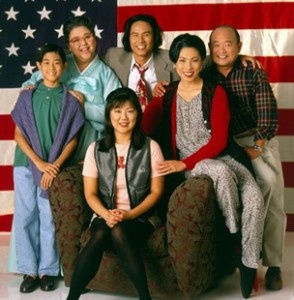
The 1994 cast of “All-American Girl” with Margaret Cho, seated center, and Jodi Long as her mother, seated right. The remaining cast from left, J.B. Quon, Amy Hill, Stewart Kim, and Clyde Kusatsu. Courtesy of Asian American Press.
Both All American Girl and Mr. T and Tina featured Pat Suzuki in the cast. She was in the original Flower Drum Song, and was nominated for a Grammy in 1960 for one of her many albums.
Long said a live audience teaches an actor how to respond and adjust to transform an evening into a shared experience. In television, she said the producers and directors understand this as do the comedians in the cast.
Working with a cast and crew is about chemistry, she said, and when that magic happens where everyone pulls together to make a great production, is something that doesn’t happen as often as she’d like.
“Egos get nutty and that makes it hard,” Long said. “When we have a team with everyone working together that is a real blessing.”
Long said she can rest at the end of the day if she believes that she and everyone involved in a show did a lot of good work.
“That is all you can ask,” she said. “Show up to work and be kind.”
Film & Television
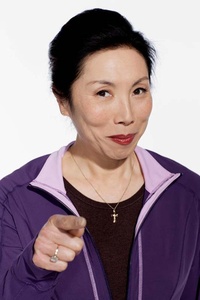
Jodi Long portrays ‘Ok Cha Sullivan’ in “Sullivan & Son,” returning for a second season on June 13. Courtesy of Asian American Press.
Long’s first television show was Nurse in 1981. The CBS drama starred Michael Learned of The Waltons. She made her film debut that same year in Rollover starring Jane Fonda and Kris Kristofferson.
There were not a lot of film roles for Asian women at the time and she recalled the 1981 writers’ strike made it impossible to find new work and returned to theater for a couple of years.
“I did theater for a really long time, from college until my early 30s,” she said. “Then I came to Los Angeles and started in a little television.”
In the 1980s, Long appeared on Scarecrow and Mrs. King, The Equalizer, The Cosby Show, Roseanne, L.A. Law, and many others. In the 1990s she was a regular in Miss Match and appeared as Judge Marcia Phelps in Eli Stone, with other judge roles on Law & Order: LA, on House MD, Made in Jersey, and Franklin & Bash.
Her film work continued with reporter roles in Splash, Born on the Fourth of July, and New York Stories. She appeared in The Exorcist III, Robo Cop 3, and even in a 1987 New Order rock video.
She traveled to London in 1987 for a role in the Mike Newell film, Sour Sweet, starring Sylvia Chang and Danny Dun. It is the story of an immigrant Hong Kong family trying to make a new life and Long plays the elder sister “Mui.”
“I was grateful for the experience,” she said. “It was a great role.”
Back in the U.S., Long continued films work in a 1988 film about Patty Hearst, with appearances in Robo Cop 3, Striking Distance. Her television roles continued with the role of “Patty, the power lesbian” in Sex and the City.
Later in 2013, Long’s most recent dramatic role, in A Picture of You, will be released. She plays the mother of estranged siblings “Kyle” and “Jen”, who travel from New York City to rural Pennsylvania to pack up the home of their recently deceased mother.
“Film and television is a very different experience from theater,” Long said. There is some immediacy with the live audience on Sullivan & Son. The people and the laughs are real, which contrasts to film, where the experience is one-on-one with the camera.
“When its you and camera, then that is your partner,” Long said. “That is the lens, communicating what the scene is about, or what the human experience is about.”
The stage director has some control but with theater the actor is out there on their own. With film and television the executive producer, writer, and director control the performance to some extent, and the performance can also be in the final edits.
“Theater has the playwright, and once the show opens it is controlled by the actor and that is why I love theater,” she said. “Once the curtain goes up it is you and the audience.”
*This article was originally published on Asian American Press on June 1, 2013.
© 2013 Asian American Press



